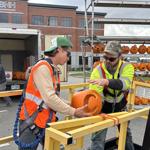Key Takeaways
Rheumatoid arthritis might be driven in part by premature aging of the immune system
People with joint pain had signs of accelerated immune aging
These signs became more predominant after they were diagnosed with rheumatoid arthritis
WEDNESDAY, Sept. 10, 2025 (HealthDay News) — Rheumatoid arthritis might be caused in part by a prematurely aging immune system, a new study says.
Researchers found that people with joint pain and arthritis exhibited signs of accelerated immune aging, according to findings published recently in the journal eBioMedicine.
This suggests that immune aging might play a direct role in the development of rheumatoid arthritis, an autoimmune disorder that occurs when the immune system attacks a person’s joints, researchers said.
“We’ve discovered that immune aging isn’t just a consequence of rheumatoid arthritis — it may be a driver of the disease itself,” senior researcher Niharika Duggal, an associate professor of immune aging at the University of Birmingham in the U.K., said in a news release.
For the study, researchers analyzed the health of 224 people. Of those, 69 were healthy controls and the rest at different stages in the development of rheumatoid arthritis.
Blood test results found lower levels of T-cells — white blood cells that help identify and attack viruses and bacteria — among patients with early joint symptoms. These patients also had reduced production of fresh T-cells from their thymus gland.
A comprehensive score of immune status called IMM-AGE also reflected accelerated immune aging in people prior to their diagnosis for rheumatoid arthritis, researchers said.
“We found that people in the early stages of rheumatoid arthritis — i.e. before a clinical diagnosis — show signs of faster immune system aging,” Duggal said.
Researchers found even more advanced signs of immune aging among patients following their formal diagnosis with rheumatoid arthritis, including deteriorating T-cells and broader signs of inflammation, results show.
This opens up a potential opportunity for heading off rheumatoid arthritis, Duggal said.
“These findings suggest we might be able to intercept the disease development in at-risk individuals and prevent it from developing by using treatments that slow aging, such as boosting the body’s natural process for clearing out damaged cells,” Duggal said.
Future study could focus on whether existing drugs could counter premature aging and slow or halt the progression of rheumatoid arthritis in people at high risk for the condition, researchers said.
More information
The Mayo Clinic has more on rheumatoid arthritis.
SOURCES: University of Birmingham, news release, Sept. 8, 2025; eBioMedicine, Sept. 3, 2025
What This Means For You
New treatments aimed at slowing immune aging might help manage or prevent rheumatoid arthritis, researchers said.





















(0) comments
Welcome to the discussion.
Log In
Keep it Clean. Please avoid obscene, vulgar, lewd, racist or sexually-oriented language.
PLEASE TURN OFF YOUR CAPS LOCK.
Don't Threaten. Threats of harming another person will not be tolerated.
Be Truthful. Don't knowingly lie about anyone or anything.
Be Nice. No racism, sexism or any sort of -ism that is degrading to another person.
Be Proactive. Use the 'Report' link on each comment to let us know of abusive posts.
Share with Us. We'd love to hear eyewitness accounts, the history behind an article.